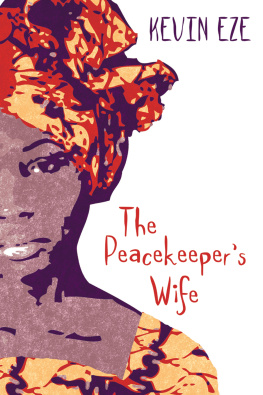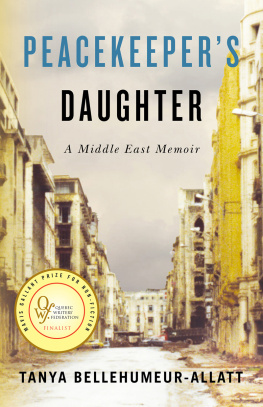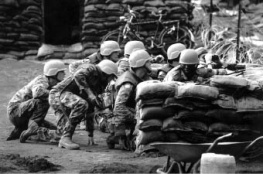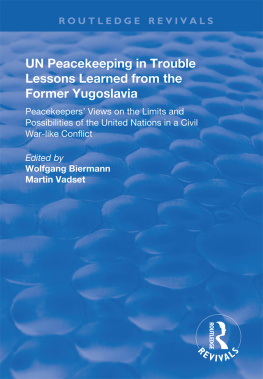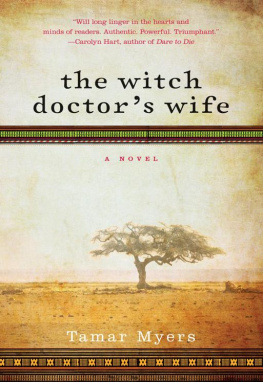About the author
K evin Eze was born in Nigeria where he began writing and learning the piano at the age of seven. He studied Literature and Philosophy at the Jesuit Faculty in the DR Congo and Sociology at the University of Paris XII, France. A student of Theology, his stories have appeared in the anthologies Writers Writing on Conflict and Wars in Africa (2011), Long Journeys (2013), the Commonwealth non-fiction anthology Safe House (2016) and in The Antigonish Review and Actuelle. Kevin lives and writes in Senegal.
The Peacekeepers Wife
Kevin Eze

Published by Amalion Publishing 2015
Amalion Publishing
BP 5637 Dakar-Fann
Dakar CP 00004
Senegal
http://www.amalion.net
Copyright Kevin Eze 2015
Cover designed by Anke Rosenlcher
ISBN 978-2-35926-044-1
ISBN 978-2-35926-045-8 (ebook)
Printed in the United Kingdom by CPI Group (UK) Ltd.,
Croydon, CR0 4YY
All rights reserved. No part of this publication may be reproduced, transmitted, or stored in a retrieval system, in any form or by any means, without permission in writing from Amalion Publishing, nor be otherwise circulated in any form of binding, media or cover than that in which it is published.
In memory of my father,
Evaristus Okoye Eze (Ugonnia),
who told stories and inspired me to tell them
Contents
Prologue
M alika, the peacekeepers wife, watched while the plane lifted her husband into the sky. She ran to the chair beneath the mango tree and sat down straight-legged, in the shade surrounded by a gentle whirl of cool breeze. As the plane flew out of sight, she considered what she would now endure as a peacekeepers wife how long the war would last, how long she would wait, in what shape her husband would return home. She grabbed the pack of nuts by her side, untied it and plunged her hand in. As she raised her palm to push some nuts into her mouth, a sudden pull of the wind scattered them on the floor. She jumped out of her chair and raced after the fleeing nuts. My nuts oh, she cried. Eh eh eh! The cashews rolled on the ground, caked with dust, and into the gutter.
Malika glowered and signs of confusion etched themselves on her face. Her soft, black cheek creased into the furrows of a rotten pawpaw. Shed spent the evenings before her wedding listening to her mother. Of the many things her mother had said regarding how to adjust to events beyond ones control, some kept coming back to her. She must set her sails; she must make choices; she must be herself.
She felt like singing. To calm down. To sieve her stress. To strain the strain. But the words got stuck in her throat. She spat out a thick lump of saliva to release the bile in her mouth and walked over to the cement bags lying horizontally next to the gutter. She stood there, her eyes glittering in a surprised epiphany at how her life was changing.

She heard the screech of a wanderer, a passer-by, and peeked across the gate to the perambulating man. She disliked his dreadlocks and his sullen way of dressing. Taking her eyes off him, she turned to the western reach of the compound where her clothes flapped from the laundry line, helplessly dry, helplessly abandoned. It had escaped her mind to collect her clothes three nights in a row and this spawned a feeling of guilt that ran up in her guts. The wanderers scream resounded deep in her ears; it rang like the clang of a xylophone. The wanderers voice receded. And she remembered.
She remembered that the next day, she would set forth at dawn to Sangomar beach, and she thought of how difficult trekking along the sandy path after Tabaski would be. The smell of mutton, especially its roasted skin some still on fire acrid and strong with red maps of blood dotting the sandy streets. Malika pushed her head upwards, as she did whenever she had a choice to make. Then lowering her head, her eyes met the carving on the wall.
She looked at the carving, made by a towns boy, a self-made sculptor from their ancestral home. She admired the carving as the conscious and unconscious efforts of an artist whose work was as delightful as the sound of the instruments engraved on it when, in reality, they only came to life in music at Renaissance Square to welcome a British prime minister.
At the centre of the carving sat the drum, the king of instruments. Its strap, like the lines of the cloud when laced with a budding rainbow, curled around the other instruments, leaning tip to tip. At the top, the xylophone lounged spread-eagled across the carving. Dyed in shades of earth-clay, it stretched across the tableau as if resting after hours of praising a wrestlers victory. On the lower sides, the udu and the balafon, adorned by dark fancy squares, were joined at the hip and held the ensemble together, like a belt to a pair of trousers. Beyond them, the whooshing bells and shakers sheered downwards from one edge to another, face-down across the carving and, decreasing in size, vanished into the unseen recesses of the carving. The instruments bonded like friends. Should one not perform, Malika thought of it as robbing friends of their harmony. The kalimba inclined toward the Thoughts, of her trip to Sangomar came flooding back.
Step by step, one catches a monkey in the bush, a proverb her mother-in-laws tongue had often set free, fell from her lips. Malika said it in her polished accent, not imitating Fatimata.
She forgot the proverb, reached swiftly for a glass of water from a stool nearby and drank it to the dregs. As she put down the glass, it slipped from her fingers, the shards of glass flung across the bare concrete floor. Thieee! she cried. It was her husbands glass, the one that bore the Manchester United logo. As she fell to the floor to gather the glass, she started weeping. A full, body-shaking weep, one that brought back memories of their first embrace, on fine sands beneath broad skies, of the joy it brought her, a mans hands on her shoulders protective, valiant.
This is the work of a witch, she said. Yes. Theres a witch about; but I will fight.
PART ONE
I ssas departure had made her bitter-sweet. Far from home, a monstrous war devoured the vast Congo, sucked in armies from across the rivers and tainted the palms of monarchs.
Somewhere beyond her minds eye, a place called Kivu and a land close to the borders of countries of three syllables, R-wan-da and U-gan-da, Issa, Malikas husband, was on his way to help save The Bleeding Heart of Africa.
Congo, the beautiful Congo.
If ever Issa arrives there, he will guard the UN base, witness the Second Congo War from a helicopter gunship, bar rebels from raping women their mothers age. And in the path of explosives, he will patrol the borders of a ruined territory, once graceful, still rich.
The BBC of many tentacles named the war Africas World War I. And each time the World News turned to the refugee camps in Kivu, it poured forth a tale of conspiracy, of steady blows, of turbulent winds, of difficulties man-made, of resources highjacked, of evil in mens hearts; a tale of dishonesty, of courage misused, of historical accident, of chance.
Africas World War I. Malika hated the tag. Hmm! she boomed at the reporter. Do you think we should be making war rather than love? Madam, she continued, addressing the voice from the radio, shuffling from foot to foot. Must there be Africas World War II? Must there be she then sobbed. She hoped it would stop within days; that in her stoutest expectations, all the renegade generals would face the judges-on-red-hoods, like in the Last Judgement.
Next page
